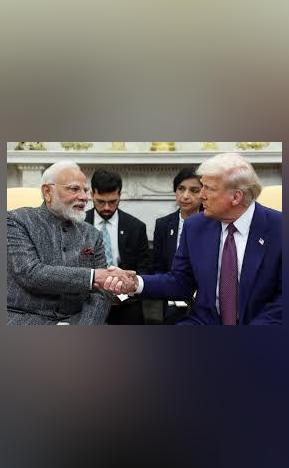
India-US Mini Trade Deal Talks Hit Stalemate: Report
In a significant development, talks between India and the United States over a mini trade deal have hit a roadblock. The negotiations, which have been ongoing for several months, have stalled due to India’s refusal to grant greater access to its agriculture, dairy, and genetically modified (GM) crop markets. The US has been pressing for these concessions, but India is unwilling to budge, fearing that it would compromise its domestic interests.
According to a report, the Indian government has toughened its stance against US demands, making it clear that it will not compromise on its agricultural and dairy sectors. This development has raised concerns that the ongoing negotiations for a mini trade deal may collapse if the US continues to press for concessions. In the event of a failure to reach an agreement, Indian exports to the US could face a 26% reciprocal tariff, which would have a significant impact on the country’s economy.
The mini trade deal, which has been under discussion for several months, aims to reduce tariffs and increase trade between the two countries. However, the negotiations have been complicated by entrenched positions on both sides. The US has been pushing for greater access to India’s agriculture and dairy markets, while India has been resisting these demands.
The US has been seeking greater access to India’s agriculture sector, which is a significant part of the country’s economy. Indian farmers have been resisting these demands, fearing that greater imports would lead to cheaper imports and damage their livelihoods. The US has also been seeking greater access to India’s dairy market, which is a rapidly growing sector. Indian dairy farmers have been resisting these demands, fearing that greater imports would lead to cheaper imports and damage their livelihoods.
In addition to agriculture and dairy, the US has also been seeking greater access to India’s GM crop market. India has been resistant to GM crops, fearing that they could harm the environment and human health. The US, on the other hand, has been promoting GM crops as a way to increase food production and reduce pesticide use.
The stalemate in talks has raised concerns that the ongoing negotiations for a mini trade deal may collapse. If the talks fail, Indian exports to the US could face a 26% reciprocal tariff, which would have a significant impact on the country’s economy. The Indian government has been keen to avoid a tariff war with the US, but it is unwilling to compromise on its agricultural and dairy sectors.
The Indian government has been seeking to balance its domestic interests with its desire to increase trade with the US. The country is the world’s second-largest economy and a major market for Indian exports. However, the Indian government has been reluctant to compromise on its agricultural and dairy sectors, which are a significant part of the country’s economy.
The stalemate in talks has also raised concerns about the impact on the Indian economy. The country’s economy has been slowing down in recent years, and a failure to reach a trade deal with the US could exacerbate the situation. The Indian government has been seeking to boost exports to increase economic growth, but a failure to reach a trade deal with the US could make it difficult to achieve this goal.
In conclusion, the talks between India and the US over a mini trade deal have hit a roadblock due to India’s resistance to US demands for greater access to its agriculture, dairy, and GM crop markets. The Indian government has toughened its stance against US demands, making it clear that it will not compromise on its domestic interests. The stalemate in talks has raised concerns that the ongoing negotiations for a mini trade deal may collapse, which could have a significant impact on the Indian economy.






